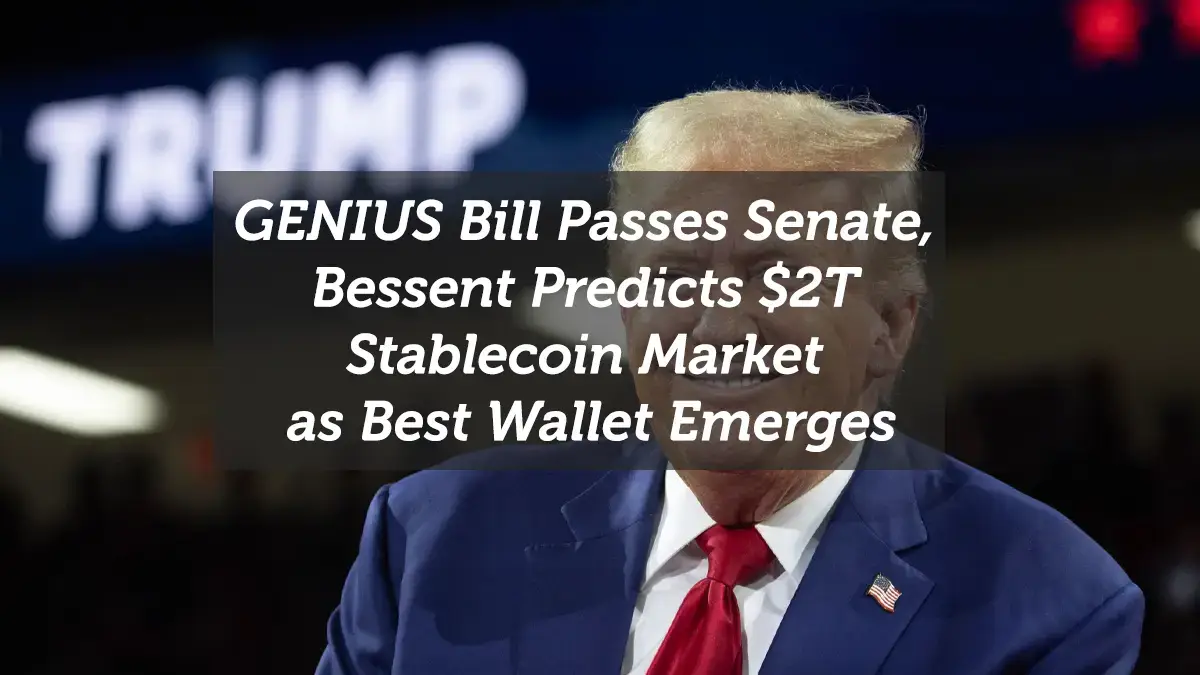
GENIUS Bill Passes Senate, Bessent Predicts $2T Stablecoin Market as Best Wallet Emerges
In a pivotal move that could reshape the future of digital assets in the United States, the US Senate passed the GENIUS Act—a comprehensive stablecoin regulation bill—with a strong 68–30 vote. As crypto inches closer to mainstream adoption, this bill lays the foundation for a fully regulated, institutional-friendly stablecoin market projected to reach $2 trillion, according to Treasury Secretary Scott Bessent.
But not everyone is thrilled about the growing government role. As oversight deepens, crypto users seeking financial sovereignty and privacy are turning to non-custodial solutions like Best Wallet, an emerging DeFi wallet focused on user autonomy.
What Is the GENIUS Act?
Short for “Guaranteeing Essential National Infrastructure Using Stablecoins,” the GENIUS Act introduces sweeping reforms to stabilize and legitimize the US dollar-backed stablecoin market.
Key Provisions Include:
- Only licensed institutions can issue stablecoins.
- Stablecoins must be backed 1:1 by high-quality liquid assets (T-bills, bonds, etc.).
- Monthly reserve disclosures are mandatory.
- Issuers must comply with AML and KYC regulations.
- Yield-bearing stablecoins are prohibited.
- Regulatory oversight will be shared between the Treasury, CFTC, and state authorities.
The bill now heads to the House of Representatives. If it passes there, it lands on President Trump’s desk before August.
Why It Matters: Legitimacy vs. Centralization
Supporters of the bill, including SkyBridge Capital’s Anthony Scaramucci, argue that regulated stablecoins can streamline payments and slash $7 trillion in global transaction costs. It also brings clarity that investors and institutions have long demanded.
However, critics like Senator Elizabeth Warren raise concerns about:
- Potential misuse of stablecoins linked to political figures
- Loopholes that enable foreign capital to influence major exchanges
- Surveillance risks and lack of data privacy
- More power being concentrated in fewer hands
These concerns were further amplified by news that a stablecoin associated with Trump’s World Liberty Financial may receive large investments from Abu Dhabi-based firms—sparking fears of political and financial entanglements.
Stablecoin Privacy Crisis? Enter Best Wallet
With tighter control on crypto issuance and usage on the horizon, decentralized tools like Best Wallet are rapidly gaining popularity among crypto purists.
Best Wallet is a non-custodial, privacy-first mobile wallet that puts full asset control back into users’ hands. It allows for:
- Complete ownership of private keys
- Anonymous sign-up (no KYC)
- Cross-chain swaps with low fees
- Support for 1,000+ assets across Ethereum, Bitcoin, BSC, Polygon, Base, and more
Unlike centralized platforms that could be impacted by new regulations, Best Wallet ensures your digital assets remain sovereign.
Best Wallet’s Key Features at a Glance
- Fireblocks MPC technology for enterprise-grade security
- Cross-chain swap support via 30 bridges
- Cloud backups with no seed phrases needed
- Upcoming Best Card for real-world crypto spending
- Built-in DApp browser and token presale access
- Native $BEST token with 104% APY staking and governance rights
“Best Wallet is engineered for a post-regulation world—giving users self-custody, privacy, and access to all major chains without handing over identity,” says one early adopter.
$BEST Token Outlook: 185% Upside?
With the GENIUS Act setting the stage for a regulated crypto future, $BEST—Best Wallet’s utility token—is gaining investor attention.
Currently priced at just $0.025, analysts believe $BEST could hit $0.072 by year-end, riding the wave of regulatory tailwinds and increasing demand for private wallets.
Benefits of holding $BEST include:
- Reduced transaction fees
- Staking rewards (104% APY)
- Governance participation
- Early access to features like Best Card
What Comes Next?
If the GENIUS Act passes the House and is signed by President Trump, it will mark the first formal legislative acknowledgment of stablecoins by the US government. It could legitimize the industry while also raising the barrier for entry.
And while institutions rush in to take regulated positions, individuals still need tools that preserve autonomy. That’s where non-custodial wallets like Best Wallet will shine brightest—offering a decentralized hedge against creeping centralization.
Final Thoughts
The GENIUS Act signals a historic pivot: crypto is no longer fringe—it’s financial infrastructure. As the US takes its first big step toward stablecoin regulation, investors, developers, and users must prepare for both opportunity and oversight.
If you value privacy, control, and the ability to opt out of surveillance-based systems, exploring alternatives like Best Wallet now could be a smart long-term play.
Regulation is here. The choice is yours: comply, or go full DeFi.
FAQ
Q: What is the GENIUS Act?
It’s a US Senate-approved bill that would regulate stablecoins by requiring licenses, backing assets, and regular audits.
Q: When will the GENIUS Act take effect?
If approved by the House and signed by President Trump, it could go into effect before August 2025.
Q: What is Best Wallet?
A decentralized, non-custodial crypto wallet focused on privacy, security, and cross-chain interoperability.
Q: How is $BEST token used?
For staking, governance, fee discounts, and unlocking upcoming features like Best Card.
Q: Can I buy $BEST now?
Yes, it’s currently available in presale at around $0.025.














